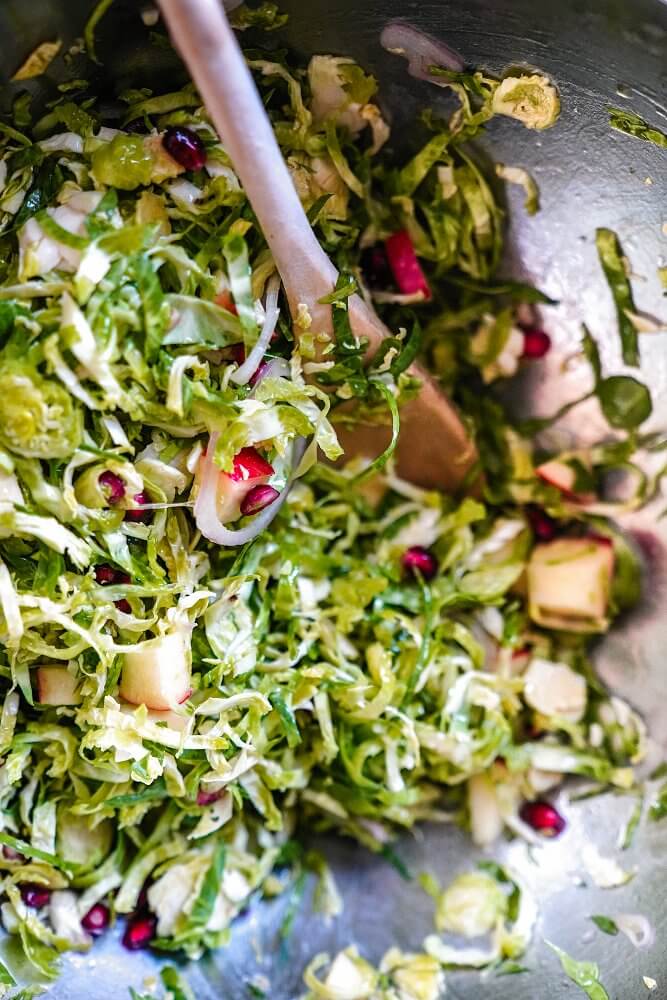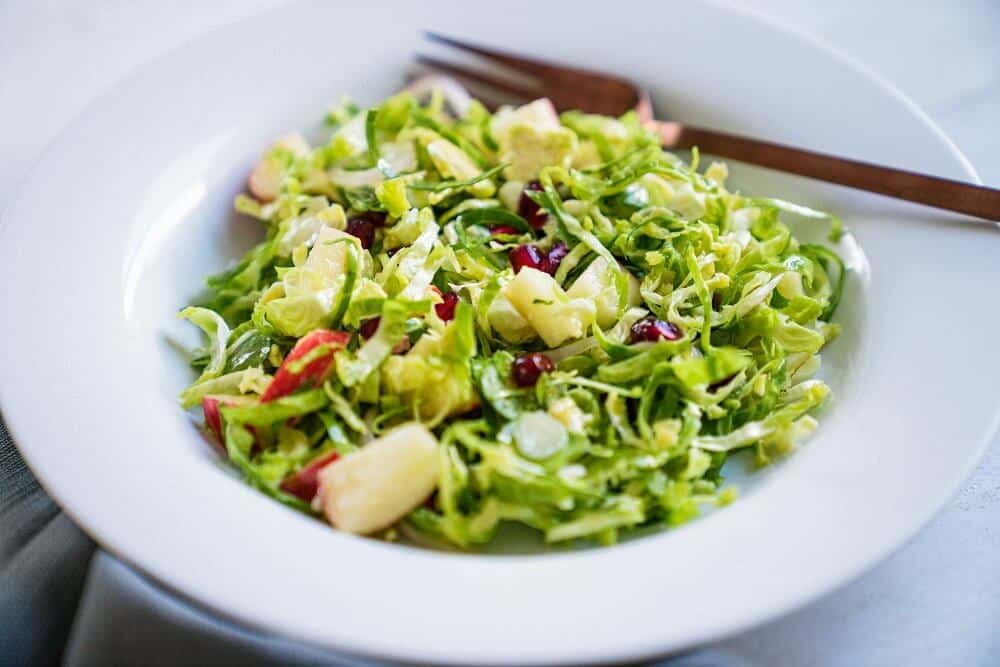This post may include affiliate links; see our disclosure policy.
This shaved Brussels sprout salad tastes like a bowl of vibrant confetti! It stars apple, pomegranate and a tangy sweet dressing.

How can you eat a healthy, vegetable-centric food on the regular? Many people ask our secret, and it’s this: the non-diet diet. CNN just published an article on the non-diet diet approach. Eating delicious, healthy, fresh recipes on the regular: without feeling the need to add foods to a “bad list”. And foods like this Shaved Brussels Sprouts salad taste so incredible, it’s hard to believe they’re also good for you! To us, this salad is like the best treat: feathery shaved Brussels sprouts, the vibrant burst of pomegranate seeds, and a tangy sweet vinaigrette. If this is healthy eating…well, we’re all in!
Also try: Classic Brussels Sprout Salad

What’s great about a shaved Brussels sprout salad?
Recipes like this shaved Brussels sprout salad are what healthy eating and adventurous cooking should be about. It’s the perfect fall salad or winter salad for whether Brussels sprouts are in season! Here’s what makes it so tasty:
- It’s got all the contrasts. This one is a study in texture contrasts: the feathery shaved Brussels, the pop of the Pomegranate seeds, and the bright crunch of the apple. It’s vibrant and colorful, covered in a lightly sweet vinaigrette.
- It’s darn delicious. And the flavor: it’s like eating a bowl of confetti, but the healthy kind! After noshing on it, you’ll truly feel a vibrant glow: and that’s not just fad diet BS.
A few time savers for this salad
In the winter I tend to gravitate towards comfort foods like breads and cheeses, so this winter salad has been a welcome antidote. It’s also a gluten-free, and vegan salad recipe. It’s naturally sweet and you can remove the maple syrup for a sugar-free dressing. It does take a bit of time to put together, but it’s well worth it. Here are a couple time savers for putting it together:
- Purchase shaved Brussels sprouts from the grocery. You can find these packaged in the produce section at some grocery stores.
- Purchase shelled pomegranate seeds. We’ve been tipped of that Brussels sprouts are sold shaved at Trader Joe’s.

How to shred Brussels sprouts
Shredding or shaving Brussels sprouts is actually more difficult than you think! Cut them the wrong way, and the pieces look all wrong. If you have a food processor, you also can chop off the ends and use the slicing attachment on a food processor to shred the Brussels sprouts. However, using a knife is just as easy! To get those signature shreds, here’s what to do — see the video below!
- Remove any tough outer layers with your fingers.
- With a large Chef’s knife, cut the Brussels sprout in half lengthwise.
- Place the cut side down and thinly slide cross-wise to create shreds.
- Separate the shreds with your fingers. Discard the root.
How to seed a pomegranate
The other main skill in this recipe is cutting and seeding a pomegranate! It takes a few minutes, but it’s very easy and absolutely worth grabbing the fresh fruit. Here’s what to know:
- Cut the pomegranate in quarters, then remove the seeds in a bowl of water. This avoids a big mess of pink splatters all over your kitchen! We’ve got a great step-by-step tutorial: go to How to Cut a Pomegranate.
- Or, buy pomegranate seeds instead! Pomegranate seeds that are already removed are easy to find at your local grocery. The downside? They’re not as fresh, and they go bad quickly.

This shaved Brussels sprout salad recipe is…
Vegetarian, vegan, gluten-free, plant-based, dairy-free, and naturally sweet. For sugar free and Whole 30 friendly, omit the maple in the dressing.
Shaved Brussels Sprouts Salad
This pomegranate shaved Brussels sprout salad tastes like a bowl of vibrant confetti, and will leave you glowing from the inside out.
- Prep Time: 25 minutes
- Cook Time: 0 minutes
- Total Time: 25 minutes
- Yield: 4 1x
- Category: Salad
- Method: Raw
- Cuisine: American
Ingredients
- 1 pound Brussels sprouts*
- ½ cup pomegranate seeds*
- 1 apple
- 1 shallot
- 1 tablespoon Dijon mustard
- 2 tablespoons white wine vinegar
- 1 tablespoon maple syrup
- 1⁄8 teaspoon kosher salt
- 6 tablespoons extra-virgin olive oil
Instructions
- Shred the Brussels sprouts: see the video below or go to How to Shred Brussels Sprouts.
- Seed the pomegranate: Go to How to Cut a Pomegranate.
- Cut the apple into bite-sized pieces. Thinly slice the shallot into rings.
- In a small bowl, whisk together the mustard, white wine vinegar, maple syrup, and kosher salt. Gradually whisk in the olive oil 1 tablespoon at a time until thick and emulsified.
- In a large bowl, stir all ingredients together. Serve immediately.
Notes
Buying shredded Brussels sprouts and shelled Pomegranate seeds can help cut down prep time. We’ve heard shredded Brussels sprouts are available at Trader Joe’s!
Looking for more Brussels sprouts recipes?
Brussels sprouts are the new best thing: they’re totally on trend, especially shredded and roasted. Here are some of our favorite Brussels sprouts recipes on the site:
- Add the best sweet salty sauce for Brussels Sprouts with Maple Glaze
- Go roasted with Crispy Brussels Sprouts or Spicy Brussels Sprouts
- Grab your frying pan for Fried Brussels Sprouts
- Use them as a pizza topping in Caramelized Onion and Brussels Sprout Pizza
- Make a cozy pot of Farro & Brussels Sprout Soup
Last updated: December 2020





This salad was delicious! Served with chili and cornbread. What a hit! Used mandolin to shred the brussel sprouts, and deseeding the pomegrante was therapeutic! Thank you.
So glad you enjoyed it!
I made this the other night a little worried that it may be too healthy for us – i shouldnt have been, it was amazing and the leftovers made for an easy lunch ?. To speed things up I shredded the brussel sprouts in my mixer. You have to be super careful, of course, but it worked like a charm for me.
Haha, I’m so glad it wasn’t “too healthy” and mostly delicious! Great idea for shredding in the mixer: we’ve had some issues in the past, but I’m glad to hear it worked for you! Thank you for making this one!
Made this and it was fantastic! Only change was adding some fresh Parmesan cheese. Definitely a new favourite! Thank you!
I love the idea of fresh Parmesan in that salad — it would add a delicious savory note! Great idea and thanks for making it!
I LOVED the pomegranate Brussels sprouts salad! My fiance devoured it and I had a lot of friends ask me for the recipe. Thank you for sharing! I’m excited for your book!
Oh fantastic, I’m so glad to hear this! Thank you so much for the feedback and cheers to more nourishing veg in 2018!
Adding this and the creamy cauliflower soup to my menu for this week! And your thoughts about the non-diet diet resounded with me as well. Cooking and eating real food makes managing weight and health so much easier. Looking forward to your book!
Oh fantastic! I hope that you enjoyed these two, they’re some of our favorites for early this year. And I’m so glad the non-diet diet resonates too! Sending good wishes for 2018 :)
Made this to go along with some mashed potatoes for dinner last night! It was delish! 4th recipe I’ve tried from your site in the last couple of weeks and the 4th recipe we’ve loved! Nice to have simple, doable recipes. We are no strangers to brussel sprout salads however its amazing how small changes like the addition of apple to a salad or mustard to a vineagrette can change a dish up enough to make it feel new. YUM, thank you!
Oh that sounds like a perfect balance to cozy mashed potatoes! I’m SO glad to hear that you’ve loved all 4 recipes you’ve tried — that makes our day!
Hi there! I shred brussel sprouts in my Cuisinart food processor using the chopping disk …it works amazingly! This looks yummy!
Oh this is a great tip for speeding up the process! We tried that a long time ago and it actually just chopped our Brussels into fine pieces — oops! I’m thinking maybe we didn’t use the chopping disk? Or maybe we didn’t put them in the right way. Do you have to make sure to put them in top down?
My daughter has been pushing me to try brussel sprouts for ages. I think this recipe is the perfect start point. Your dressing looks divine with the tangy mustard and sweet maple.
Yes!!! Shredded is a great way to start to love Brussels sprouts — they’re quite fresh and tasty that way! Our other top way is roasted in a super hot oven — love those crispy bits! :) Let us know what you think!
Wonderful recipe. Cannot wait to see your cookbook when it launches! -Joe
Thank you so much for the kind words about the cookbook — it means the world! We appreciate you!